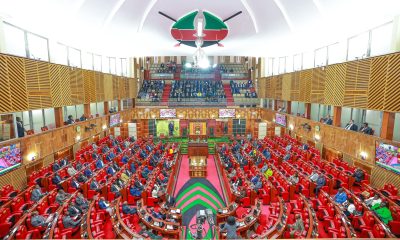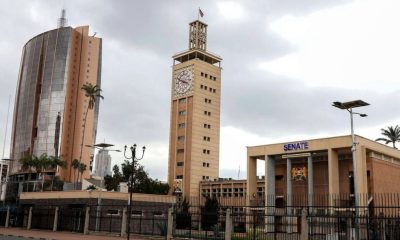News
Privacy Outcry: KRA Boss Defends Finance Bill 2025 Powers to Spy on Bank Accounts

Commissioner General defends controversial data access clause as lawmakers raise alarm over citizen rights
Kenya Revenue Authority Commissioner General Humphrey Wattanga found himself under intense scrutiny this week as lawmakers questioned the agency’s support for a contentious provision in the Finance Bill 2025 that would grant KRA sweeping access to citizens’ personal data and trade secrets without requiring court orders.
The heated parliamentary session saw Finance Committee Chairman Kuria Kimani directly challenge Wattanga over what he termed a “huge data privacy breach,” demanding accountability for the agency’s handling of taxpayer information.
“Chair, don’t you think that is a huge data privacy breach? Someone is clearly not doing their job. You have to own up that this is a breach and someone is not doing their job,” Kimani pressed during the committee hearing.
The controversial clause has sparked widespread opposition, with at least ten entities, including the influential Law Society of Kenya, formally opposing the provision. Critics argue it represents an unprecedented intrusion into citizen privacy rights and could set a dangerous precedent for government data collection.
**Existing Privacy Breaches Exposed**
Beyond the proposed legislation, KRA is also facing accusations of current data privacy violations through its iTax business registration platform. Lawmakers revealed that the system allows access to sensitive personal information using only a taxpayer’s PIN number, exposing details including contact information, email addresses, residential locations, and employment details.
“Why is KRA infringing on data privacy? For instance, application for manufacturers’ authorization on iTax requires the user to provide manufacturers’ details including phone numbers and residential address,” Kimani highlighted, pointing to specific examples of potential overreach.
The revelation suggests that privacy concerns extend beyond proposed future legislation to current operational practices within the tax authority.
**KRA’s Defense and Justification**
Despite mounting criticism, Wattanga defended the controversial provision as necessary for improving tax compliance and meeting revenue targets. The authority has set an ambitious revenue target of Ksh2.9 trillion for the 2025/2026 financial year, and officials argue that enhanced data access is crucial for achieving these goals.
“We admit that’s a serious matter and we will address it,” Wattanga acknowledged during the parliamentary session, though he maintained the agency’s position that the provision would boost tax compliance efforts.
The Commissioner General also dismissed claims that high tax obligations are driving foreign corporations to relocate to neighboring countries, insisting that various incentives have been introduced to support businesses operating in Kenya.
**Broader Constitutional Questions**
The debate raises fundamental questions about the balance between government revenue collection and constitutional privacy rights. Legal experts have expressed concern that automatic access to personal data without judicial oversight could violate constitutional protections and establish a troubling precedent for other government agencies.
The timing of the controversy is particularly sensitive, coming as Kenya grapples with economic challenges that have necessitated aggressive revenue collection strategies. However, critics argue that fiscal pressures cannot justify compromising fundamental rights protections.
**Parliamentary Pressure Mounts**
The Finance Committee’s tough questioning signals growing parliamentary resistance to the provision. Lawmakers appear increasingly concerned about the implications of granting such broad powers to any government agency without adequate oversight mechanisms.
The committee’s demand for accountability extends beyond the proposed legislation to current practices, with members calling for immediate reforms to existing data handling procedures within KRA systems.
**Next Steps**
As the Finance Bill 2025 continues through the legislative process, the data privacy provision faces an uncertain future. The strong opposition from civil society organizations, legal bodies, and now parliamentary committees suggests the government may need to reconsider or significantly modify the clause.
The KRA’s acknowledgment that current data handling practices need addressing may also prompt immediate reforms to existing systems, regardless of the bill’s ultimate fate.
The controversy highlights the ongoing tension between Kenya’s revenue mobilization efforts and citizen privacy rights, a balance that will likely require careful navigation as the country seeks to strengthen its fiscal position while maintaining democratic principles and constitutional protections.
Kenya Insights allows guest blogging, if you want to be published on Kenya’s most authoritative and accurate blog, have an expose, news TIPS, story angles, human interest stories, drop us an email on [email protected] or via Telegram
-

 Business1 week ago
Business1 week agobetPawa Empire Crumbles: Mr Eazi’s Betting Gambit Unravels Amid Partner’s Shadowy Deals
-

 News6 days ago
News6 days agoDCI Probes Meridian Equator Hospital After Botched Procedure That Killed a Lawyer
-

 Business5 days ago
Business5 days agoMinnesota Fraud, Rice Saga, Medical Equipment Deal: Why BBS Mall Owner Abdiweli Hassan is Becoming The Face of Controversial Somali Businessman in Nairobi
-

 Business1 week ago
Business1 week agoKRA Boss Humphrey Watanga In Big Trouble In Sh5.5 Billion Rice Import Scandal
-

 Investigations2 weeks ago
Investigations2 weeks agoKERRA Homa Bay Region Manager Calvince Thomas Accused of Swindling Businessman Ksh 2 Million in Phantom Tender Deal
-

 Business1 week ago
Business1 week agoState Set to Demolish Pastor Ng’ang’a’s Church in Sh28 Billion Railway City Push
-

 Business7 days ago
Business7 days agoControversial Turkish Firm Celebi Canceled in India Over Security Concerns Acquires Strategic Property in Nairobi’s Main Airport
-

 Politics5 days ago
Politics5 days agoYour Excellency! How Ida’s New Job Title From Ruto’s Envoy Job Is Likely to Impact Luo Politics Post Raila































